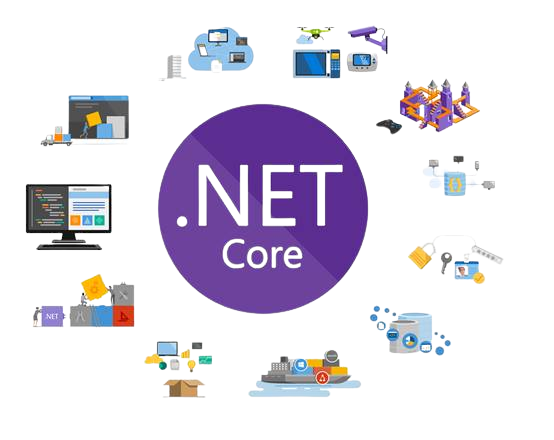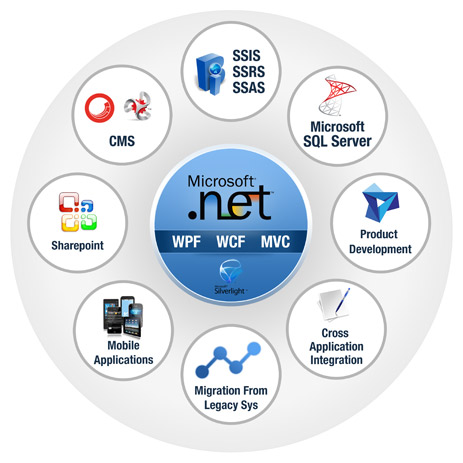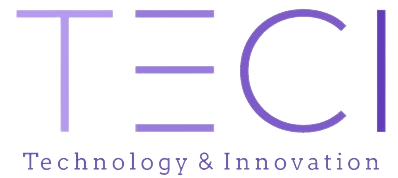.NET Programming
.NET Core is a multi-platform framework that may be used to create software for Windows, Linux, and Macintosh. Unlike other software frameworks,.NET Core is the most adaptable and can be used to create a wide range of software such as Web applications, Mobile apps, Desktop applications, Cloud services, Microservices, APIs, Gaming, and IoT applications.
.NET Core supports many programming languages, including C#, VB.NET, F#, XAML, and TypeScript. These programming languages are free and open source, with separate communities in charge of them.

Characteristics of .NET Core
.NET Core distinguishes itself by being open source, cross-platform, contemporary, flexible, lightweight, quick, user-friendly, shareable, and built with future software development in mind.
.NET Core is Free and Open Source
The .NET Core platform is free and open source, with the source code project available on GitHub. .NET Core development is open to all developers, and there are presently thousands of active contributors trying to improve existing features, add new ones, and fix problems and anomalies.
The.NET Foundation, an independent, non-profit organization, is in charge of overseeing the development of.NET Core. Nowadays, over 60,000 developers and 3,700 enterprises contribute to the .NET ecosystem.
Furthermore, .NET Core is accessible for free and is subject to MIT and Apache licenses.
.NET Core is Cross-platform
.NET Core is Sharable
With .NET Core, there is a uniform API model written in .NET Standard, which applies to all .NET applications. This means that the same API or library can be utilized across multiple platforms and languages.
.NET Core is Modern
.NET Core differs from previous frameworks in that it was created with contemporary requirements in mind. Mobile compatibility, the flexibility to design once and run anywhere, scalability, and high speed are all examples of this. Furthermore,.NET Core can build apps for a wide range of devices, from IoTs to game consoles.
.NET Core may use current language elements such as object-oriented and modular programming, generics, collections, lambdas, Language Integrated Query (LINQ), and asynchronous programming by using C# version 8. This increases developer productivity. Visit this website to learn more about C# 8 features: C# 8 Features.
Both Visual Studio 2019 and Visual Studio Code are among the most powerful and modern developer IDEs available, meeting modern demands while emphasizing cleanliness, speed, and productivity. Go here to learn more about Visual Studio 2019 features: Visual Studio 2019 New Features.
.NET Core is Fast
When compared to its predecessors, .NET Framework and .NET Core 2.2, .NET Core 3.0 is exceptionally swift. In fact, it outperforms other server-side frameworks like Java Servlet and Node.js in terms of speed.
According to a TechEmpowers report, .NET Core is faster than any other framework. The TechEmpower benchmark compares web application frameworks for tasks including database access for single and multiple queries, fortunes, data updates, plaintext, and JSON serialization.
.NET Core is Lightweight
Because of its lightweight nature, .NET Core may be incorporated into your program or installed side-by-side for a user, machine-wide, or on a server. .NET Core may also be simply installed within Docker containers.
.NET Core is Friendly
.NET Core can communicate with the .NET Framework, Xamarin, and Mono via .NET Standard. Furthermore, .NET Core is compatible with a wide range of popular web frameworks and libraries, including React, Angular, and JavaScript. Importantly, TypeScript is important in the .NET Core and Visual Studio ecosystems.

What types of apps can we build using .NET Core?
With the introduction of Razor, developers can now create dynamic web pages using C# and TypeScript. This groundbreaking technology enables C# developers to construct web applications entirely in C#.
.NET Core offers a wide range of frameworks and tools for developing desktop applications. The four major frameworks for desktop application development include Windows Forms, WPF, UWP, and Xamarin. These frameworks are also interoperable with one another, enabling developers to build cross-platform desktop applications with ease.
Windows Forms is a technology designed specifically for building Windows desktop applications and was one of the first components of .NET Framework. WPF (Windows Presentation Foundation), on the other hand, is a newer technology for building Windows desktop applications that was introduced with the .NET Framework version.
UWP technology was launched after the release of Windows 8 and has since matured. UWP utilizes XAML for the presentation layer (UI) and C# for the backend programming.
Containers are the virtual machines of today, and .NET Core’s modularity, lightweight design, and flexibility make it easy to deploy .NET Core apps into containers. Containers package all the app files, configuration files, and dependencies into a single, small, and independently deployable unit of software. Containers can be deployed on any platform, cloud, Linux, or Windows. .NET Core works well with both Docker and Azure Kubernetes Service.
Cloud applications are becoming increasingly popular today, and Azure supports a wide variety of them. Visual Studio 2019 makes it easy to deploy .NET Core and C# applications to Azure.
The popularity of IoT apps is on the rise, and .NET Core offers support for IoT development through the UWP framework. This framework is designed for IoT devices running Windows 10 IoT Core and can be used to build apps for devices such as Raspberry Pi, MinnowBoard MAX, DragonBoard 410c, and others.
Software developers are increasingly exploring the field of Machine Learning.
C# and UWP are commonly used with Unity, a widely-used game development framework for creating games across various platforms, including mobile, desktop, console, TV, VR, AR, and the Web.

